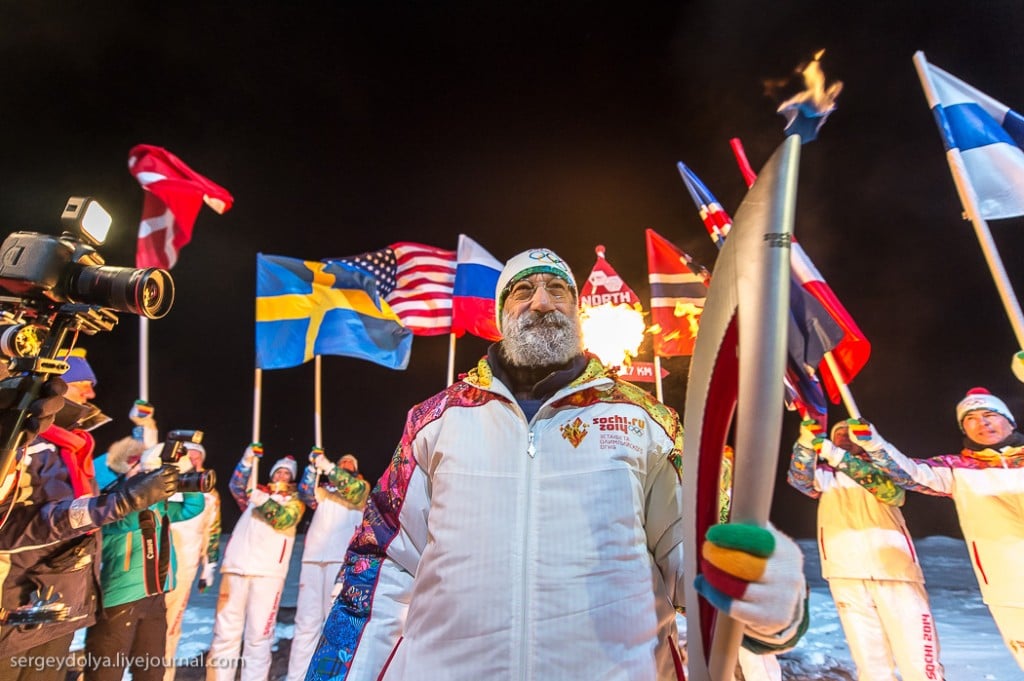
Chilingarov carrying the Olympic Torch. (c) Sergey Dolya
The Olympic torch for the upcoming Winter Games in Sochi, Russia has made quite the journey so far. It’s only a little over a month into its 123-day, 65,000 kilometer relay, but already, the torch has made it to the frigid north and even outer space. This past week, cosmonauts carried the torch during the spacewalk, a first for the Olympic record books. And on October 19, the Olympic flame reached the North Pole after a record-breaking 91-hour trip aboard the nuclear icebreaker, 50 Let Pobedy, from Murmansk, Russia.
Artur Chilingarov, the celebrated Russian polar explorer, planted the Russian flag on the seabed underneath the North Pole in 2007. Six years later, he waved the Olympic torch – a symbol of international unity – on top of it while the flags of the eight Arctic Council member states waved in the background. The 2007 flag-planting journey was a private expedition that included a Swedish pharmaceuticals company amongst its sponsors, but many in the international community saw it as a Russian exercise through and through. Canadian Foreign Minister Peter Mackay criticized, “This isn’t the 15th century. You can’t go around the world and just plant flags and say ‘We’re claiming this territory.'” Russia may not have technically claimed the North Pole through flag planting, but it did anoint Chilingarov a “Hero of Russia,” adding to his previous accolade as “Hero of the Soviet Union.”
Lifting the Olympic flame above the North Pole, Russia seemed to be saying, “We are the world.” But that “we” was an exclusive one. With eight national flags waving in the polar wind, the circle made around the North Pole was essentially state-based. National governments, not indigenous peoples or non-Arctic states, hoisted the flags. Russia Today reports, “Torch bearers were selected from the eight member countries of the Arctic Council – Russia, Norway, Finland, Sweden, Canada, the US, Iceland and Denmark – to symbolize international unity in the region,” though the flag of Greenland and indigenous peoples’ organizations like RAIPON was nowhere to be seen.

RAIPON’s flag: nowhere to be seen.
A list of the 11 torchbearers who joined in the Olympic moment at 90° North illustrates the outsize weight of the Arctic Council, scientists, and academics in Russia’s imagining of the Arctic compared to indigenous peoples, who were not at all represented during the ceremony. Even the official Olympics press release says that the torchbearers who supported Chilingarov were those who have “contribute to the conservation of its natural resources, animals and ecology” – and not its peoples or cultures. Given that President Vladimir Putin ordered RAIPON temporarily closed this time last year, the absence of representatives from any of Russia’s numerous indigenous groups such as the Nenets or Sami comes as no surprise. Had Canada orchestrated this event, it’s likely that indigenous peoples would have had a much stronger showing.
Alas, even if Canada hosted the Winter Olympics, it would not be able to carry the torch up to the North Pole. Russia’s speedy and showy relay leg to the top of the world showcases its Arctic prowess. No other country has a nuclear icebreaker, so no other Olympic host could have powered to the North Pole in fewer than four days. Last week, while England shut down its last remaining shipyard, Russia began construction on what will be the country’s – and thus the world’s – largest nuclear icebreaker. Rosatom, the state-owned operator of 50 Let Pobedy, sponsored the North Pole jaunt, underscoring the significance of national capabilities even in an event as internationally symbolic as the Olympic torch relay.
Chilingarov intoned, “It is the first time in history that the Olympic flame will visit a place known as the ‘top of the world.’ It is a meeting point of longitudinal meridians and time zones, where the very concept of time loses all meaning. I believe that carrying the Olympic flame to this very place is highly symbolic given that the Olympic values have endured for hundreds of years.”
Yet time has not lost all meaning at the North Pole; in fact, it is an overlooked resource, as I wrote last week. In another statement, Chilingarov lauded the icebreaker’s record-breaking voyage, of particular note given the autumn season. Climate change is also rapidly altering the Arctic environment. But Chilingarov perhaps wishes that time could lose all meaning in the Arctic – and elsewhere. If it were the 15th century, flag planting on the seabed might have worked as a claim rather than having to carry out study after bathymetric study of the Lomonosov ridge. Hinting at a national sense of underlying regret, in 2005, Putin decried the collapse of the USSR as the “greatest geopolitical catastrophe of the century.”
By carrying the Olympic torch to Sochi via the North Pole, the bottom of Lake Baikal, and outer space, Russia is attempting to reinscribe its capabilities for time immemorial under the veil of the feel-good Olympic spirit. Trying not to look over their shoulders, torchbearers announce to the world that Russia was, is, and will be a world power.